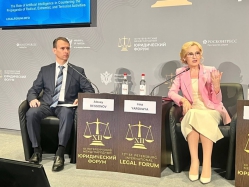Rector of the Moscow Academy of the Investigative Committee of Russia named after A. Ya. Sukharev moderated a session at the St. Petersburg International Legal Forum on the role of artificial intelligence in countering extremism and terrorism

Alexey Alexandrovich Bessonov, Rector of the A. Ya. Sukharev Moscow Academy of the Investigative Committee of the Russian Federation, moderated a session at the XII St. Petersburg International Legal Forum on the topic "The Role of Artificial Intelligence in Countering Propaganda of Radical, Extremist, and Terrorist Activities." The speakers included Artur Viktorovich Bychkov, Director of the Irkutsk Institute (Branch) of the All-Russian State University of Justice (Russian Legal Academy of the Ministry of Justice of the Russian Federation); Tatyana Anatolyevna Polyakova, Head of the Information Law and International Information Security Sector at the Institute of State and Law of the Russian Academy of Sciences; Elina Leonidovna Sidorenko, Director of the Center for Digital Economy and Financial Innovations at the Moscow State Institute of International Relations (University) of the Ministry of Foreign Affairs of the Russian Federation; and Irina Anatolyevna Yarovaya, Deputy Chairman of the State Duma of the Federal Assembly of the Russian Federation.
The event’s participants noted that by the beginning of the 21st century, one of the significant global issues was the need to organize the counteraction to extremism and terrorism in all its various forms. The use of modern technologies, artificial intelligence, and neural networks allows for achieving higher results, saving time, and quickly analyzing large amounts of information. A comprehensive approach in this field facilitates effective investigations of crimes and the development of effective measures to counter and prevent extremism and terrorism.
A.A. Bessonov noted that the global Internet, information and telecommunication technologies have significantly facilitated and expanded the possibilities for propagating radical, extremist, and terrorist activities. One of the tasks of crime detection and investigation he defined as the de-anonymization of criminals. "Artificial intelligence can assist in solving different issues: such as who registered under a pseudonym, on whose behalf calls for illegal activities were made, who is recruiting citizens into radical communities, and who is financing extremist and terrorist activities," he added.
During the session, the rector of the academy also noted that a well-trained artificial intelligence system could help an investigator in assessing the totality of gathered evidence. He added that several systems in use by law enforcement agencies already employ AI technologies, the most well-known of which is the "Safe City" system.
The potential use of artificial intelligence in the practice of solving and investigating the most dangerous crimes is being studied as part of the research work of the Investigative Committee of Russia. For example, a digital forensic model of serial crimes has been built based on methods of mathematical statistics and artificial intelligence.
"With all that said, we must remember that artificial intelligence cannot replace the creative functions of a human, nor can it fully replace humans, including in the field of law enforcement," concluded A.A. Bessonov, rector of the A. Ya. Sukharev Moscow Academy of the Investigative Committee of Russia.
Photo
26 June 18:14
Адрес страницы: http://en.sledcom.ru/news/item/1895276/

 Распечатать
Распечатать 
